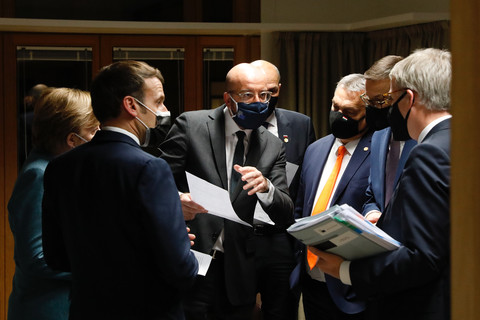[ad_1]

MEPs have warned the EU Commission that it could face court proceedings, if it does not apply a new rule linking EU funds to respect of the rule of law soon.
The European Parliament on Thursday (25 March) passed a resolution telling the EU executive that it should adopt guidelines to implement the new rule before 1 June – and consult MEPs on those guidelines before their approval.
If the commission fails to do so, the parliament could then sue the EU executive at the EU’s top court.
MEPs also confirmed that the parliament will ask the European Court of Justice (ECJ) to rule on the legality of the new tool, in an expedited procedure, after Poland and Hungary this month launched complaints.
The court challenge by Poland and Hungary could delay any action by the commission, which has said it would wait for the ECJ’s ruling – which could take over a year – before adopting the guidelines that will set out how the EU executive plans to use the new tool.
Behind the bickering
Behind the convoluted procedural bickering lies a fierce battle for the efficiency of the rule-of-law tool that was agreed by legislators last November.
The first EU tool linking the disbursement of EU funds to the respect of rule of law – if a direct link to the EU funds can be established – was hailed as a potentially potent mechanism to stop the erosion of democratic principles within the bloc.
The EU has struggled to adequately deal with concerns over judicial independence, systematic corruption, and democratic backsliding in both Hungary and Poland, which have been under EU scrutiny for years.
After an outcry from Warsaw and Budapest, EU leaders in December made a deal that the commission would only take action under the new mechanism after guidelines were established and after the ECJ ruled on the issue.
The move has effectively delayed the implementation of the mechanism – with Hungary’s prime minister Viktor Orbán facing elections in 2022 – although the commission president Ursula von der Leyen has pledged that “no case will be lost”.
MEPs argue that since the leaders’ December deal did not amend the adopted legislation, no guidelines or court ruling should postpone taking action, on the basis of the legislation which came into force in January.
“The rule of law conditionality has been valid since the beginning of this year. The superfluous European Council conclusions on the adoption of the guidelines do not change this fact. They cannot overwrite a law,” said Finnish MEP Petri Sarvamaa from the centre-right European People’s Party (EPP), who was the parliament’s lead negotiator on the issue.
Thursday’s resolution – backed by five parliamentary parties from centre-right to far left – stresses that the rule-of-law situation in some member states “warrants immediate consideration”.
It also urges the commission to “make full use of its powers of investigation for each case of a potential breach of the principles of the rule of law” by a member state, which “could affect or seriously risk affecting” the sound management of the EU budget in a direct way.
MEPs also reminded the commission that any ongoing procedure in the ECJ does not mean the legislation should be suspended.
Facts on the ground
“Every day the commission does not trigger sanctions is a victory for Viktor Orbán. Facts are being created on an almost daily basis in Hungary. […] The Fidesz government is developing ever more sophisticated ways to divert EU funds. At the same time, we are in the unique situation that the commission – the guardian of the treaties – refuses to enforce existing European law,” German Green MEP Daniel Freund said.
“For us, this resolution is a final warning shot to the commission: do your job or there will be legal consequences,” he added.
“Orbán is desperate to buy time until the 2022 election, but the European Parliament will not let him succeed,” Hungarian liberal MEP Katalin Cseh said.
Orbán’s party, Fidesz, which has recently left the EPP, reacted in a statement saying that MEPs threat was a “financial sanction for made-up political reasons”.
“With this proposal, the European Left is openly threatening the European Commission and putting unprecedented political pressure on the European Court of Justice: if politically dissenting member states are not punished immediately and retroactively, they can expect severe consequences,” Fidesz MEPs said.
[ad_2]
Source link